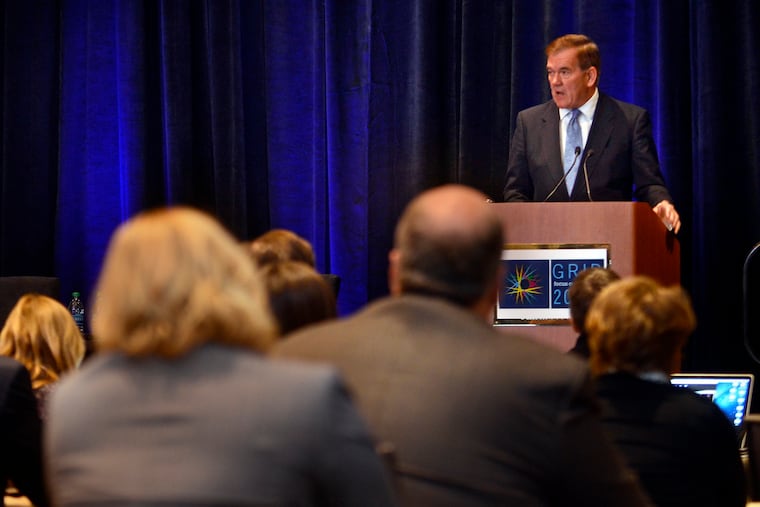Tom Ridge: App store owners push security claims to stifle competition
Apple and Google make it too difficult to download apps outside their stores, says former Pa. Gov. Ridge. And their reasons for doing so ring false.

Back when I was governor between 1995 and 2001, working with my friend Ed Rendell and local leaders like Karen Buchholz and Meryl Levitz to bring the 2000 Republican National Convention to Philadelphia, my primary responsibility was to be a cheerleader for the region. Championing the region was the best part of my job. It was also easy to do: Philadelphia was undergoing a renaissance that continues to this day. Our city is a place where talented, young people want to live, work, and create.
Just last month, Philadelphia rolled out an ambitious goal: to become the most diverse tech hub in the country. Tech hubs can spur inclusive economic development when they prioritize the innovation of entrepreneurs and allow for competitive marketplaces. It’s a priority I shared as governor, always looking to support job creators by eliminating bureaucratic red tape and incentivizing growth. Unfortunately, I’ve grown incredibly frustrated that some of today’s leading global tech companies are standing in the way.
» READ MORE: I was a Republican governor of Pa. I’m voting for Joe Biden. | Opinion
One example are the apps on our mobile devices, which are often created by startups, and are now stifled by the anti-competitive policies of Apple and Google. They contend it’s a security issue.
As a former leader of Homeland Security, that got my attention. So I decided to take a closer look.
Anyone with an Android or iPhone knows that both Google and Apple make it exceedingly difficult — if not impossible — to download apps outside of their proprietary app stores. Apple essentially prohibits users from downloading apps outside of their Apple App Store. Google uses technical complexity to make downloading apps outside of Google Play incredibly onerous.
Apple contends that its review process for new apps protects consumers from malware and viruses. In reality, security on an iPhone or iPad already is provided by the operating system and the device itself, via built-in features that include data encryption and antivirus protection. The true reason that Google and Apple take these measures is because they want the profits from the 30% fee they charge on most app transactions processed in their app stores.
Apple argues that opening iOS to third-party app stores or allowing alternative payment processing systems would expose iOS to malware. This concern is unfounded. In fact, opening the App Store would allow iOS to operate just like another Apple product: the Mac. Many of the same transactions you might conduct on an iPhone or iPad can also be performed on an Apple desktop or laptop computer, where a consumer safely downloads and installs software such as Google Chrome or Microsoft Office directly from various developers via a browser. Apple expresses no similar concern about Mac security, even though the Mac and iPhone operating systems share the same core engineering.
Apple also argues that allowing transactions to be made outside of its own in-app payment system would present security risks. Here, again, the company’s practices demonstrate otherwise, as it allows some apps — including Amazon, Uber, and Airbnb — to use third-party payment processors. Further, there is reason to believe that competition in this space would actually enhance security, as it could drive payment processors to provide the best customer experience, including security, at the lowest cost.
To support this issue and show that Apple and Google’s security and privacy arguments are purely pretextual, I recently joined a group of cybersecurity experts and former government officials with decades of experience in writing a letter on this issue to Congress. Our message was clear: Don’t let big tech use inaccurate security claims to hinder innovation. Instead, providing app developers and consumers with greater freedom and choice will significantly enhance security through competition and accountability.
“Don’t let big tech use inaccurate security claims to hinder innovation.”
Lawmakers in Washington are coming to recognize the faulty claims of security and privacy made by dominant mobile platforms in order to enforce top-down control of the app marketplace. The most promising tool to address this problem is the Open App Markets Act, proposed legislation backed by a politically and ideologically diverse group, from Sen. Marco Rubio (R-FL) to Sen. Amy Klobuchar (D-MN). The act would allow developers to distribute their apps outside of the current app stores and prevent app platforms from forcing companies to use their in-app payment systems. This piece of legislation would open up the marketplace to competition and innovation.
We have the tools at our disposal to promote a free, fair, and competitive app marketplace — and to debunk unfounded security claims from tech giants looking to maintain their monopoly. Philadelphia’s hard-working developers and the future of our talent pipeline deserve a chance to compete.
Tom Ridge was a twice-elected governor of Pennsylvania and first U.S. Secretary of Homeland Security. He serves as security advisor for the Coalition for App Fairness.